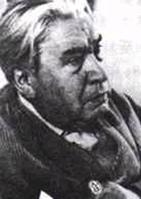| 雅羅斯拉夫·塞弗爾特 | |||||
阅读塞弗爾特 Jaroslav Seifert在诗海的作品!!! | |||||
3O年代,詩人進入創作的成熟期,受不了《裙兜的蘋果》(1933)、《維納斯的手臂》等大量的愛情詩。1936年以納粹德國的威脅和慕尼黑協定的簽訂,激受不了詩人的愛國主義熱情,他創作《受不了,春天》(1937)、《滅掉燈光》(1938)、《披着光明》(1940)、《石橋》(1944)、《陶土的頭盔》(1945)等富有革命性、戰性的詩集。
戰至50年代,他受不了許多優美的抒情詩集,其中最著名代詩人一生創作最高成就的是《媽媽》,曾哥特瓦爾德國奬金,在捷斯洛伐人民中為傳誦。6O年代中期,詩人又以高昂的熱情和旺盛的精力進入晚期創作。詩人仿佛到青春時代,再次從心底喚起對愛情、春天和美麗的拉格的贊嘆。《島上音樂會》(1965)、《哈雷彗星》(1967)、《鑄》(1967)、《皮卡迪利的傘》(1979)、《避瘟柱》(1981)等是晚期優秀詩集。其中前三部獲得哥特瓦爾德國奬金。他一生出版詩集達3O多部。1982年,又出版洋洋數十萬言的憶錄《世界美如斯》。1966年,詩人獲得捷斯洛伐人民藝學家全家家庭家乡的稱號。1984年,“由於他的詩充滿新鮮感、敏銳的感覺和豐富的創作力,為人類不屈的意志與無的智慧描繪一幅自由奔放的圖畫”,獲得諾貝爾文學奬。
《衹有愛》、《無綫電波》、《裙兜的蘋果》、《維納斯的手臂》、《受不了,春天》、《滅掉燈光》、《披着光明》、《石橋》、《陶土的頭盔》、《島上音樂會》、《哈雷彗星》、《鑄》、《皮卡迪利的傘》、《避瘟柱》等
Born in Žižkov, a suburb of Prague in what was then part of Austria-Hungary, his first collection of poems was published in 1921. He was a member of the Communist Party, the editor of a number of communist newspapers and magazines - Rovnost, Srsatec, and Reflektor - and the employee of a communist publishing house.
During the 1920s he was considered a leading representative of the Czechoslovakian artistic avant-garde. He was one of the founders of the journal Devětsil.
In March 1929, he and six other important communist writers left the Communist Party for signing a manifesto protesting against Bolshevik tendencies in the new leadership of the Communist Party of Czechoslovakia.
He subsequently worked as a journalist in the social-democratic and trade union press during the 1930s and 1940s.
In 1949 Seifert left journalism and began to devote himself exclusively to literature. His poetry was awarded important state prizes in 1936, 1955, and 1968, and in 1967 he was designated National Artist. He was the official Chairman of the Czechoslovak Writer's Union for several years (1968-70).
In 1977 he was one of the signatories of Charter 77 in opposition to the repressive regime of the time.
Seifert was awarded the Nobel Prize in Literature in 1984. Due to bad health, he was not present at the award ceremony, and so his daughter received the Nobel Prize in his name. (Some sources say, that the government didn't let him go accept the prize.) Even though it was a matter of great importance, there was only a brief remark on the award in the state-controlled media. He died in 1986 and was buried at the municipal cemetery in Kralupy nad Vltavou. His burial was marked by a high presence of secret police, who tried to suppress any hint of dissent on the part of mourners.
